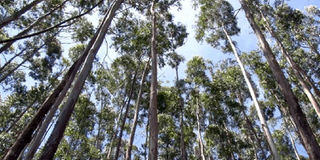Prime
Step up efforts to deal with climate change

Although Uganda ranks high in committing to a number of agreements to deal with climate change, more needs to be done to see that commitment translates to real action. FILE PHOTO
What you need to know:
The issue: Climate change
Our view: Although Uganda ranks high in committing to a number of agreements to deal with climate change, more needs to be done to see that commitment translates to real action.
To celebrate her 15th birthday this year, Leah Namugerwa planted 200 trees. This was one of the teenager’s latest efforts to raise awareness on the damage to the environment.
Namugerwa, who juggles school, protests, and giving speeches in regional capitals rallying for action to save the planet, was one of several activists with the Fridays for Future movement to receive Amnesty International’s highest human rights award for their work last week.
But Namugerwa is just one of the thousands of young people from around the world who are standing up to the sluggishness by governments and leaders in combating climate change. Hundreds of rallies were last week staged across the world by young people just before countries gathered at the United Nations for the Climate Action Summit on September 23, an event ahead of the UN General Assembly.
The UN Framework Convention on Climate Change attributes change of climate to human activity that alters the composition of the global atmosphere as observed over comparable time periods.
Although Uganda ranks high in committing to a number of agreements to deal with climate change, more needs to be done to see that commitment translates to real action. We, for instance, have the National Climate Change Policy 2015, but government still seems uncoordinated in dealing with issues regarding climate change.
Being a developing country with an economy that majorly relies on agriculture, we are exposed to climate change. This can be witnessed from severe weather partners we have experienced in the recent past such as droughts and floods.
We now have less predictable weather partners that have resulted into short rain episodes, resulting in destruction of crops and death of animals. But the change in weather has also led to prolonged rain episodes, bringing with it consequences such as flooding and landslides.
Although the Uganda National Climate Change Policy list its goal as aiming to ensure a harmonised and coordinated approach towards a climate-resilient and low-carbon development path for sustainable development in Uganda, little seems to be done to integrate climate change issues into planning, decision-making and investments.
We continue seeing individuals reclaiming wetlands, people cutting down trees to make charcoal and firms carrying out large scale sand mining in Lwera wetland and Lake Victoria, as if we have no laws to regulate these activities that have severe consequences to our environment.
Therefore, voices of the Namugerwas of today are welcome and need to be listened to if we are to step up efforts to mitigate and adapt to climate change.


